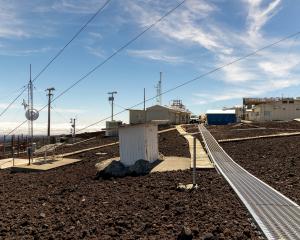Mention the words spinal tap and one can almost feel Jimmy Barnes wince. It's not that the Scottish-born, Australian-based singer dislikes the 1984 mockumentary, This Is Spinal Tap. Indeed, he likes a laugh as much as the next rocker. It's just that the subject is a little too close to the bone.
A rather non-rock'n'roll selfie of Barnes has been doing the rounds recently. Having been evacuated from Sydney's Royal Prince Alfred Hospital because of a bomb scare a couple of months ago, he is depicted in a wheelchair, holding a bag of, yes, spinal fluid. Barnes underwent surgery five times in eight days after suffering complications as a result of elective back surgery.
''It was just horrible. It was probably the most pain I've ever been in. And I've had heart surgery. It made that seem like a walk in the park. It was brutal.''
However, Barnes says he's now ''on the mend'' and back into his typically busy routine, including his current ''30:30 Hindsight'' tour, which includes a sold-out performance at the Dunedin Town Hall on Saturday, November 29.
''I'm not lazy. I love working,'' he asserts. Although Barnes' latest album, 30:30 Hindsight, is, as its title suggests, a retrospective effort, he is already looking ahead.
''We are touring until Christmas, then I take a week off in January. We then do some more touring before I start rehearsals with Cold Chisel, who will go on tour and then do some recording.
''And I have another soul album coming out, too,'' he says, referring to the follow-up to 1991's Soul Deep and 2000's Soul Deeper ... songs from the deep south.
''When I get back from this tour we'll get back in the studio again. I'll also look at writing some more originals.''
The release of 30:30 Hindsight in September earned Barnes a 14th No1 album in Australia, a record he now shares with The Beatles. Yet he doesn't regard the 30-song double album as a solo career best-of, even if he does revisit some of his biggest hits, including No Second Prize, Working Class Man, Driving Wheels, Let's Make It Last All Night and When Something Is Wrong With My Baby (featuring John Farnham).
''I think some of the songs are around pivotal points in my career and life,'' Barnes (58) says.
''Everyone listens to certain songs that take them back to certain points in their lives. The same thing goes for musicians and singers. `Oh, I remember when I wrote that ...' ''I think 30 years in any industry is a good point at which to look back. It encapsulates 30 years of blood, sweat and tears, of having a great time and some tough times.
''I just thought it'd be good to acknowledge those 30 years, then move forward with a clean slate and not have to keep referring back to the past all the time.''
30:30 Hindsight's most notable aspect is the range of talent invited to join Barnes on reworked renditions of 17 songs. They range from Australian artists Keith Urban, The Living End and Bernard Fanning to Bruce Springsteen's E Street sideman Steven Van Zandt and New Zealand heavy rock veterans Shihad, who perform Love And Hate, off his 1999 album Love and Fear.
''I sent Jon Toogood that song. It is one of my favourites. Jon sent it to the other members of the band, but they never listened to it collectively. They hadn't played it as a group until they walked into the studio with me. The first take is the version that is on the record.
''Not many bands can do that. Only bands who have a deep communication with one another can do that. And Shihad are one hell of a band.''
Barnes' comments touch on a couple of key drivers to the success of a career that took a steep upturn in 1973 when he joined an Adelaide band that would become Cold Chisel: a strong work ethic and the ability to step up to a microphone and, well, let rip.
''I was 16 when I joined Cold Chisel. I compare it to how some people attain a black belt in martial arts,'' Barnes reflects.
''Some people might think they have reached the pinnacle; others might think it's just the beginning. You learn the basics but then get to a point where you can then learn the really juicy stuff. That's what it was in Cold Chisel: I got my black belt, studied hard and got really good at what I did.
''But when we broke up, that was when we could really go out and develop what we had learned, both as musicians and as people.
''I remember the last shows in Sydney in 1983, when I was sitting on the stage singing but thinking, `why are we changing this?'. Going from that to being on my own was very frightening. Cold Chisel fans were so die-hard, so staunch, that I thought they'd crucify me.
''But I thought, the less time they've got to think about it the better. I wanted to keep the momentum going so I went into the studio in December 1983 (those sessions resulted in his debut solo album, Bodyswerve) and by February 1984 I was out touring.
''It wasn't rocket science. I just did what I did best, which is jump on tables and scream at people.''












